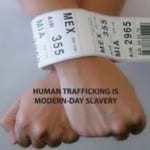 The international fight against human trafficking and modern-day slavery is losing ground, the U.S. State Department said in a new report out Monday.
The international fight against human trafficking and modern-day slavery is losing ground, the U.S. State Department said in a new report out Monday.
The total number of countries that are not meeting international standards to stop human trafficking nearly doubled to 23, according to the department’s annual report. The worst offenders were the Republic of Congo, North Korea, Saudi Arabia and Iran.
Another 41 countries were placed on the State Department’s “watch list,” which could lead to sanctions unless their records improve, the Associated Press reports.
“The problem of modern trafficking may be entrenched, and it may seem like there is no end in sight,” Secretary of State Hillary Clinton said in a statement. “But if we act on the laws that have been passed and the commitments that have been made, it is solvable.”
Roughly 27 million people are victims of human trafficking worldwide, according to the report, with 100,000 of them in the United States.
http://www.cnn.com/2011/POLITICS/06/27/human.trafficking/
http://www.cnn.com/interactive/2011/06/world/table.trafficking.report/
http://www.washingtonpost.com/politics/courts-law/us-targets-more-countries-for-potential-sanctions-on-human-trafficking-blacklist/2011/06/27/AGFvHnnH_story.html
The analysis ranks 184 governments around the world on their efforts to stop sexual exploitation, forced labor and modern-day slavery.
Those countries meeting the baseline of expectations include the U.S., Canada, Australia, Scandinavia and most of Western Europe. The bottom tier is comprised mostly of nations in Africa and the Middle East.
The report is based on information collected from U.S. embassies, government officials, nongovernmental and international organizations, published reports, unofficial tips and research trips to every region.
The first State Department human trafficking report was released 11 years ago. Since then, 148 countries have joined the Palermo Protocol, the U.N. effort to combating trafficking, and 130 countries have enabled laws criminalizing all forms of trafficking, according to CNN.
Tags: Human trafficking, Slavery

Celebrities use interactive videos to fight against child sex slavery.
“Real men don’t buy girls, and real celebrities donate their talent to a good cause. The Demi and Ashton Foundation (DNA) just launched a series of high-profile online videos to raise awareness about the harsh reality of child sex slavery. The campaign, called “Real Men Don’t Buy Girls,” features major celebrities such as Justin TImberlake, Sean Penn, Bradley Cooper, Jaime Foxx and more.”